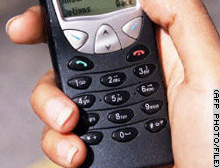Tuesday, May 13, 2003
Posted: 0657 GMT ( 2:57 PM HKT)
|
About 90 million Chinese mobile phone users regularly send text messages. |
BEIJING, China (Reuters) -- China is cracking down on rumors about SARS being spread through mobile phone messages with a tracking system used to guard against perceived threats to the government, industry sources say.
The system was reportedly set up ahead of a pivotal leadership transition in the Communist Party last November.
Authorities can read the message in as little as 15 minutes after isolating the sender, one source familiar with the system told Reuters.
"The government told carriers to have it all in place in time to patrol illegal information before the 16th Party Congress," he said.
"They caught a few Falun Gong practitioners then," he said, referring to followers of a banned spiritual movement [...]. "Now, they are using it to find rumor mongers."
Police have detained at least 12 people for spreading rumors about Severe Acute Respiratory Syndrome, which has killed 252 people in China and infected more than 5,000, almost two thirds of the world total.
Beijing has borne the brunt so far and the detentions are a fresh sign police are cracking down on rumormongering to keep a lid on the panic over SARS that has sparked scattered riots.
Rumours spread by the mobile short messaging system (SMS) have ranged from Beijing officials being poised to impose martial law to crop dusters spraying the city with disinfectant by night. Another advised people to drink and smoke to ward off SARS.
Mobile phone operators, vendors and Beijing's Internet Supervision Bureau all declined to comment on the tracking system.
But an executive at a Shanghai-based firm which has written tracking software for the government said: "China wants to monitor SMS the way it watches the Internet."
Telecoms equipment vendors have sold tracking systems to carriers, sources said.
About 60 million Chinese surf the Internet and some 90 million send regular text messages.
The administration already censors the Internet, television, radio, publications and sometimes screens telephone calls for content deemed objectionable.
http://edition.cnn.com/2003/WORLD/asiapcf/east/05/13/sars.sms.reut/index.html
Category: Falun Dafa in the Media






